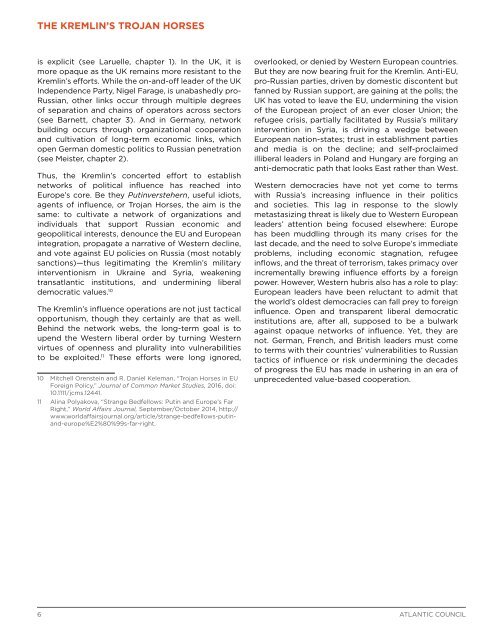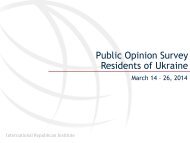You also want an ePaper? Increase the reach of your titles
YUMPU automatically turns print PDFs into web optimized ePapers that Google loves.
THE <strong>KREMLIN’S</strong> <strong>TROJAN</strong> <strong>HORSES</strong><br />
is explicit (see Laruelle, chapter 1). In the UK, it is<br />
more opaque as the UK remains more resistant to the<br />
Kremlin’s efforts. While the on-and-off leader of the UK<br />
Independence Party, Nigel Farage, is unabashedly pro-<br />
Russian, other links occur through multiple degrees<br />
of separation and chains of operators across sectors<br />
(see Barnett, chapter 3). And in Germany, network<br />
building occurs through organizational cooperation<br />
and cultivation of long-term economic links, which<br />
open German domestic politics to Russian penetration<br />
(see Meister, chapter 2).<br />
Thus, the Kremlin’s concerted effort to establish<br />
networks of political influence has reached into<br />
Europe’s core. Be they Putinverstehern, useful idiots,<br />
agents of influence, or Trojan Horses, the aim is the<br />
same: to cultivate a network of organizations and<br />
individuals that support Russian economic and<br />
geopolitical interests, denounce the EU and European<br />
integration, propagate a narrative of Western decline,<br />
and vote against EU policies on Russia (most notably<br />
sanctions)—thus legitimating the Kremlin’s military<br />
interventionism in Ukraine and Syria, weakening<br />
transatlantic institutions, and undermining liberal<br />
democratic values. 10<br />
The Kremlin’s influence operations are not just tactical<br />
opportunism, though they certainly are that as well.<br />
Behind the network webs, the long-term goal is to<br />
upend the Western liberal order by turning Western<br />
virtues of openness and plurality into vulnerabilities<br />
to be exploited. 11 These efforts were long ignored,<br />
10 Mitchell Orenstein and R. Daniel Keleman, “Trojan Horses in EU<br />
Foreign Policy,” Journal of Common Market Studies, 2016, doi:<br />
10.1111/jcms.12441.<br />
11 Alina Polyakova, “Strange Bedfellows: Putin and Europe’s Far<br />
Right,” World Affairs Journal, September/October 2014, http://<br />
www.worldaffairsjournal.org/article/strange-bedfellows-putinand-europe%E2%80%99s-far-right.<br />
overlooked, or denied by Western European countries.<br />
But they are now bearing fruit for the Kremlin. Anti-EU,<br />
pro-Russian parties, driven by domestic discontent but<br />
fanned by Russian support, are gaining at the polls; the<br />
UK has voted to leave the EU, undermining the vision<br />
of the European project of an ever closer Union; the<br />
refugee crisis, partially facilitated by Russia’s military<br />
intervention in Syria, is driving a wedge between<br />
European nation-states; trust in establishment parties<br />
and media is on the decline; and self-proclaimed<br />
illiberal leaders in Poland and Hungary are forging an<br />
anti-democratic path that looks East rather than West.<br />
Western democracies have not yet come to terms<br />
with Russia’s increasing influence in their politics<br />
and societies. This lag in response to the slowly<br />
metastasizing threat is likely due to Western European<br />
leaders’ attention being focused elsewhere: Europe<br />
has been muddling through its many crises for the<br />
last decade, and the need to solve Europe’s immediate<br />
problems, including economic stagnation, refugee<br />
inflows, and the threat of terrorism, takes primacy over<br />
incrementally brewing influence efforts by a foreign<br />
power. However, Western hubris also has a role to play:<br />
European leaders have been reluctant to admit that<br />
the world’s oldest democracies can fall prey to foreign<br />
influence. Open and transparent liberal democratic<br />
institutions are, after all, supposed to be a bulwark<br />
against opaque networks of influence. Yet, they are<br />
not. German, French, and British leaders must come<br />
to terms with their countries’ vulnerabilities to Russian<br />
tactics of influence or risk undermining the decades<br />
of progress the EU has made in ushering in an era of<br />
unprecedented value-based cooperation.<br />
6 ATLANTIC COUNCIL



